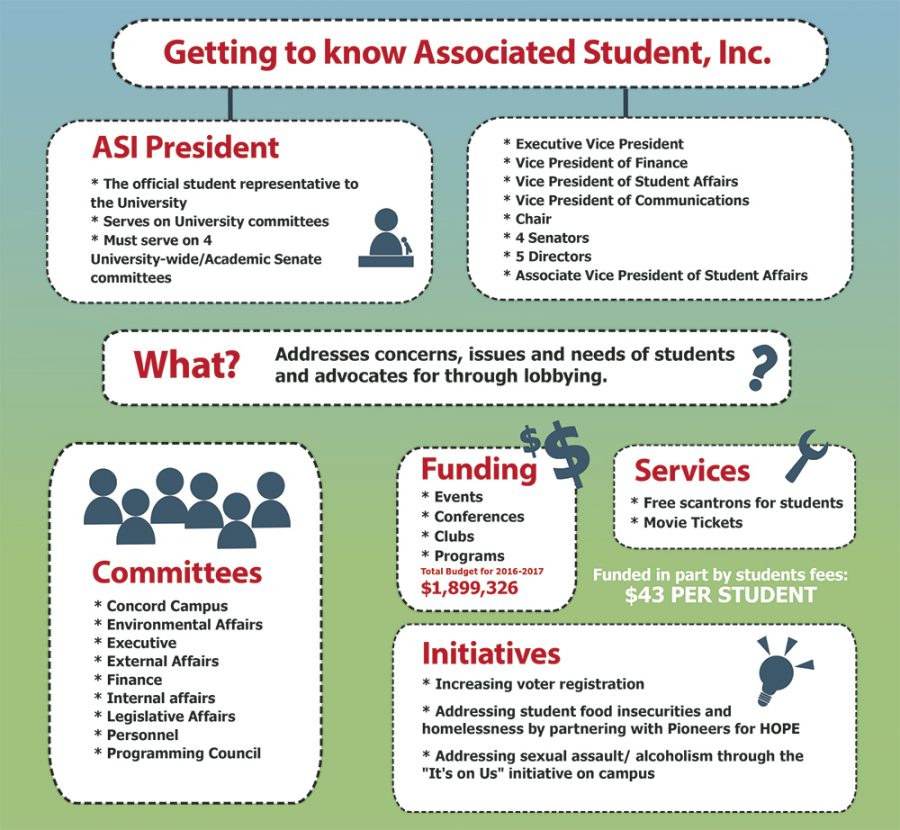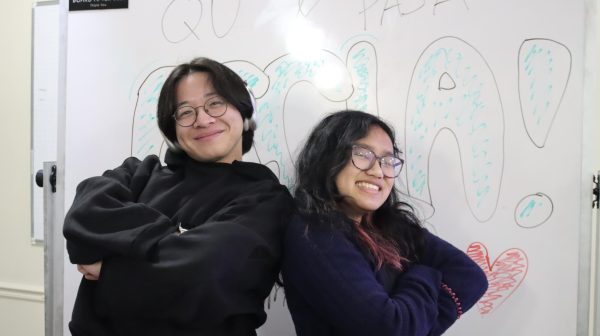ASI cracks down on voting and homelessness
With the November 8 Election Day approaching, Cal State East Bay’s student government is currently working to increase student voter registration.
The efforts are primarily online and include sending links through social media and email blasts that link to the California online voter registration webpage, according to ASI Vice President of Communications Karen Parada.
Associated Students, Inc.’s director of legislative affairs has composed a calendar of events and a social media schedule that range the start of school until Oct. 24, the voter registration deadline for these efforts, said Erik Pinlac, executive director of ASI.
Homelessness has also been flagged as a top priority for student government. A study commissioned by CSU Chancellor Timothy White in Feb. 2015 revealed that one in 10 CSU students is homeless and one in five goes without consistent access to food.
ASI is conducting a campus-wide survey of students to determine how many go without consistent food and shelter. Based on the findings, a resolution will be presented to the university, said Pinlac.
Two ASI board members are serving on the advisory board of Pioneers for H.O.P.E. — Helping Our Pioneers Excel — a new program that provides students with meals, housing assistance, emergency funds and referrals to other resources.
“If you’re worried about where your next meal is coming from, you’re not going to do well in class,” said Parada.
Student Government on Campus
If you’ve ever grabbed a free scantron from the new University Union minutes before a test or attended a campus al Fresco event — where rapper Kamaiyah and singer Marc E. Bassy performed last Wednesday — you’ve utilized one of the largest organizations on Cal State East Bay’s campus, perhaps without even realizing it.
Associated Students Inc. is a student-run organization that allocates student fees to fund student services and campus events like these.
Students often recognize the organization for its association with “welcome back” pool parties, mixers and soccer tailgates, but ASI is also involved with campus initiatives like East Bay’s African American Resource Center and the DREAM center for undocumented students, according to Parada. Students requested these two resource centers last year.
ASI drafted and passed a resolution to inform campus administration about what students wanted to see on campus.
The African American Resource Center task force — on which ASI has two representatives — met multiple times last winter and spring to discuss how to move forward with the project, which is still in its infancy.
Since the resolution, the DREAM center has been discussed, but the task force has not met yet, according to Pinlac.
How Does ASI Operate?
ASI is funded in part by the $43 student body fee that is incorporated into tuition costs every quarter, according to Parada. The organization has the authority and budget to fund campus clubs and programs. ASI’s total budget for 2016-17 is $1,899,326, according to Pinlac.
ASI functions like a miniature government and is run by a 15-member board of directors which consists of a president, executive vice president, vice president of finance, vice president of Student Affairs, associate vice president of Student Affairs, vice president of communications, a chair member, four Senators and five directors, according to the ASI website.
All board member positions are held by students and are paid by East Bay’s Human Resources Department. Students have to run for the positions in the spring and are elected to one-year terms, beginning on June 30 and ending the same time the following year. Last spring, 14 positions were open for reelection.
Nine committees currently support some of these positions and serve as something like a task force, according to Parada.
Committees include: the Concord Campus Committee, Environmental Affairs Committee, Executive Committee, External Affairs Committee, Finance Committee, Internal affairs Committee, Legislative Affairs Committee, Personnel Committee and the Programming Council Committee.
According to the ASI official by-laws, committees are formed in order to assist the Board of Directors in governing the various activities of the university.
Common Student Concerns
ASI is the self-proclaimed “advocate for students” and aims to function as a liaison between students and the university administration. Parada said the main purpose of the organization is to listen to student’s issues and concerns and convey them in writing to the university officials for a resolution. ASI decides how to address student issues based on certain criteria, including the scale of the concern and who is involved, according to Pinlac.
Parada said that common concerns are heard from transfer, commuter, international and freshman students.
Transfer students often have problems transferring course credits from their previous schools. Commuter students sometimes feel disconnected from campus culture, international students can feel isolated due to a language barrier and freshmen are often confused about how to initiate a relationship with a major advisor.
ASI also covers some expenses for students who want to attend conferences and other events relating to their major but can’t afford to do it on their own, explained Parada.
ASI assisted with the travel expenses for an internship in Mexico for her major, in biology, pre-med last year.
“ASI’s goal is to provide students with what they really need and be there for them, whether it’s through funding or events,” said Parada.












